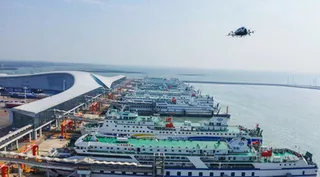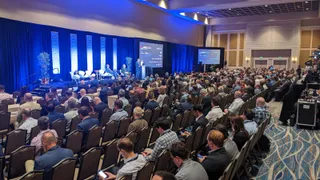Civil Aviation Training Next
Contact Our Team
For more information about how Halldale can add value to your marketing and promotional campaigns or to discuss event exhibitor and sponsorship opportunities, contact our team to find out more
The Americas -
holly.foster@halldale.com
Rest of World -
jeremy@halldale.com

Across the 30-plus years that Halldale and CAT have been working with the airline training and simulation community, we thought we had seen it all: terrorism, wars, SARS, volcanoes, 9-11, ebola, plus accidents and incidents – all of which have impacted our friends and colleagues and their businesses, as well as ours.
They were new and unwelcome experiences, and we dealt with them at the time and moved on. But they all pale into relative insignificance when compared to Covid. This one is different. Ours and many other industries were almost forbidden to trade by our governments, and many forced to furlough or make significant numbers of staff redundant.
At some point there will be a review of the actions taken, or not taken, and it is to be hoped that this experience will enable us to deal with the ‘next one’ far more uniformly and far less destructively to our society and its economy than we have in 2020-21.
Until that time, and until Covid is manageable and rendered relatively harmless, many of us are still reeling from the disruption and uncertainty that continues. It is a year of recovery, though for some whose governments have failed them or whose resources are limited, it may well be close to the end of the year or 2022 before they see a more usual lifestyle – let’s not say ‘Normal’, as it will not be as it was.
Whilst it was easy to get into Covid (imposed lockdowns), getting out of Covid is far more difficult. A minority of countries are managing vaccine distribution quite well and in those countries the availability of multiple vaccines will accelerate the number vaccinated, which is already causing an encouraging decline in the number of infections and, far more importantly, the number of fatalities. We are not yet out of the woods.
One unintended (and welcome) consequence of the extreme pandemic impact is hastening the adoption of technology that otherwise we may have assimilated over several years. That it was not an ‘unsympathetic business owner imposing profit-driven change’ on an unwilling workforce certainly made change easier.
For those of us who were already considering work from home as a more cost-effective way of working, those few who were adamant that they did not want to do so were suddenly given no choice. A sharp shock was unavoidable. Most of our team now seem happy enough to consider only a limited return to the office, but we are fortunate – most of us have worked together for multiple years. We are, however, wondering how we will manage when we start to rehire, possibly later this year; how do we find the right people, onboard them, and remotely bring them up to speed.
Build Back Different
In the overblown phrase, “Build back …”, the third word might simply and more accurately be ‘different’. For the airline industry, what better time to do so when your original business model has been trashed and will remain so with far fewer high-priced business tickets likely to be bought for at least several years.
Existing issues, notably ‘green’ concerns, increasing unrest over the inflight experience, ticket price variability, opaque ‘got you’ billing practices, and the sheer difficulty of dealing with customer service issues all required a reset. C-suites are no doubt crafting a far better flying experience, more comfort, lower capacity and some higher pricing; hopefully in that order. I hope I am not being overly optimistic.
We also have other essential issues we must manage; the mental health of our workforce (and, by the look of it, the mental health of our passengers) and the ever more urgent need to expand the diversity of our workforce. As one of our colleagues said recently: “We are not competing with other airlines for talent; we compete with all the other professions”, and in the main we are not doing well enough. While many countries have no aviation policy and still insist on taxing flight education and training, this is unlikely to improve! Airlines expecting high-quality personnel to pay for their airline education and training at vast expense – only to drop them in harder economic times – will need to think again. Many of the best will not be back post-Covid and as an industry we need to retain them and keep them employed.
What does this mean for training and the use of simulation?
Ground school will be radically different. More training will be via remote access with even more training migrated from fixed bases and times to anywhere, all the time, on demand.
Assessment, grading and checking will be inbuilt into these self-paced and likely AI-assisted programmes.
The military is already using VR and AR devices for ever more of the flight and maintenance curricula. They have been networking simulators across countries for several decades. These devices have arrived in the civil space and, such are the price and operational advantages offered, they will take up much of the current training programme, leaving the FFS focussed on check flights, bridge training and requalification.
The Virtuous Circle of data from operations transferred to training departments to improved curricula, and training data sent back to flight operations for a ‘reality check’, offers opportunity for continuous near-real-time improvement. In that regard, military and airline training is closer than it ever has been in the similarity of future training models; the two training tracks should be exchanging ideas.
Finally, AI offers the long-anticipated personalised or tailored learning programme built to serve each student.
As ever, the big players will adopt all of these changes as soon as they and their regulators can. Those more resource-challenged operators and world regions? There is the ongoing challenge.
Andy Smith, CEO and President, Halldale Group


